Content warning: this review contains mentions of suicide.
This review contains mild spoilers.
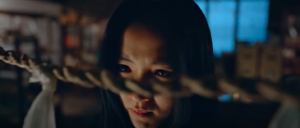
It’s always a challenge to end a mystery or horror story. There will inevitably be questions peppered across the plotline that need answers, and the reveal of what’s behind the terror is almost inevitably going to be underwhelming if not handled properly. SBS’s new horror drama Revenant manages, for the most part, to meet these challenges, though not without some stickier moments of plot machination. After an engrossing first half, the last six episodes maintain the tension, fear, and great central performances, even if the final episode and some of the story beats do fail slightly.
Continuing the story of the evil spirit possessing San-yeong (Kim Tae-ri) and folklore professor Yeom Hae-sang (Oh Jung-se) trying to figure out why, Kim Eun-hee’s chilling thriller does not let up in its second half. After multiple incidents of forced suicides, along with the discovery of a separate entity known as a hungry ghost, the latter group of episodes turn more towards the lore and mythology that lies behind these deaths.
Revenant is the latest in the canon of Korean media exploring the world of folklore. With the central villain of this piece being an evil juvenile ghost, there is much to be explored regarding rituals, talismans ,and dark imagery. We see our main trio of characters (San-yeong, Hae-sang and junior detective Lee Hong-sae, played by Hong Kyung) collecting five objects connected to the spirit in order to defeat it, as well as their efforts to find out its real name. There are ghostly drawings of the moon and dark branches that recur in different scenes, specially-wound rope that can protect against a spirit entering, and even a particular day of the year where ghosts cannot be active.
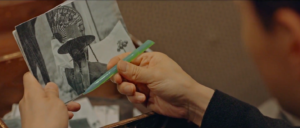
While these various rituals and practices are intriguing and captivating—the story behind the fifth object is particularly well presented—there is a sense of deus ex machina here. For example, the particular day of the year where ghosts cannot be active, introduced only at the point in the narrative where it is useful to the protagonists, is a clumsy addition. Other ritualistic points are well explained within the context of the drama, both through the professor and the use of flashbacks, but occasional moments feel like merely handy ways to escape a corner the plot has written the characters into.
Despite this, the drama still manages to maintain both an overall sense of momentum and the right level of poignancy to give impact to the many deaths. The pacing across the episodes is well measured, with one central point of the mystery being the focus of each one. As the episodes continue, these deaths become more significant, with the main detective Seo Mun-chun (Kim Won-hae) being one of the victims. The fallout from this is particularly emotional, with Hong Kyung giving a subtle yet moving performance as the junior detective who is both shocked at witnessing his senior jump out of a window and deeply saddened by his loss.
Plot beats like this one keep the emotional impact of this ghost’s destruction central to the drama. As the reason behind its creation becomes clearer (the juvenile ghost was created by murdering a child, in order to ensure enduring wealth and power to the family who ordered said killing), there is much exploration of the trauma and sadness that both creates and trails behind the horror.
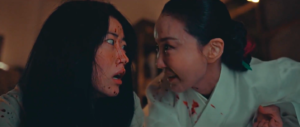
We see tenderly rendered flashbacks to the 1950s village where the murder of a young girl took place, and multiple scenes of her and her relationship with her jealous sister (a small but impactful performance from Shim Dal-gi). In other sections of the story, we meet a young poor boy living with the rich family of Professor Yeom as a teen, and see his jealousy at the lavish life he cannot lead turn him into a red-eyed hungry ghost. Characters who could otherwise be seen as simple tragic figures or horrific monsters get dimension through these moments of backstory.
The performance of Kim Tae-ri as San-yeong also continues to be the emotional heart of Revenant. As the series progresses, San-yeong’s connection to the spirit attached to her becomes stronger. This includes more and more scenes where the character is entirely possessed. It is a bold directorial decision to have this be portrayed almost entirely through Kim’s performance alone, with only the effect of her shadow with wildly billowing hair (and later an uncanny moment in a mirror) to add any indication of evil.
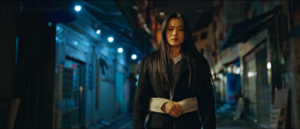
She is left to demonstrate the presence of an evil spirit through only her expressions, vocal intonations, and changes in posture. It’s a performance of stunning nuance, with often only her face changing the entire mood of a scene. Through her delicate choices, we get to see the depth of San-yeong’s confusion and fear, the extent of the evil spirit’s wickedness, and her motivations. She is the perfect anchor for the series, and the strength of her performance is able to tie together the horror and emotion of the various different storylines.
The cinematography of the drama also deserves a mention. Many of the key moments involving possessed San-yeong feature her centrally in frame, adding a sense of the uncanny to a drama that, whilst glossy, otherwise deals more in the style of realism. This is also true of the colour palette used in several key moments. There is a sepia overtone to the scenes set it in the 1950s, whilst a final supernatural encounter between San-yeong and the spirit possessing her is filmed with strange green lighting over everything. These moments, along with the bright colours of some of the cursed objects, act as neat visual punches of boldness in a world largely filled with muted tones. Flashes of the bright, vivid, and bizarre work as a great reflection of the supernatural invading the mundane lives of the characters.
Ultimately, Revenant is a successfully frightening and compelling drama. Whilst there are moments in the final few episodes that feel like convenient last-minute additions, and rules that could have been more coherently introduced, the conclusion still satisfies. The main actors give sturdy, and sometimes outstanding, performances and also gel well together. Kim and Hong’s chemistry is particularly impressive, especially given that their characters’ relationship only hints at a romantic element.
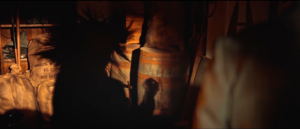
So, as for the challenge of effectively ending a horror narrative, does Revenant succeed? With the many folkloric elements having clearly been well-researched, and with a narrative that ties them together succinctly (if sometimes too conveniently), this drama is a puzzle with pieces that slot neatly into place. Thanks in no small part to Kim Tae-ri, the revelations of what the central ghost is, and what is motivating it, make dramatic sense and provide a satisfying climax. Kim Eun-hee, the show’s writer, has exceled in this genre before, and this well-ordered, chilling ghost story is yet another example of her horror prowess.
(Images via Disney+, SBS.)


